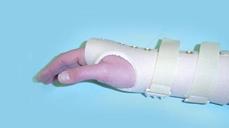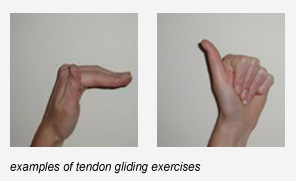Carpal tunnel syndrome
What is carpal tunnel syndrome?
 Example of a splint used to manage carpal tunnel syndrome.
Example of a splint used to manage carpal tunnel syndrome.
Carpal tunnel syndrome (CTS) is a disorder of the hand caused by pressure on the median nerve as it runs through the wrist.
CTS may occur due to:
- overuse and repetitive hand movements
- arthritis
- pregnancy.
Signs and symptoms
The signs and symptoms of CTS include:
- numbness
- pins and needles especially in the thumb, index and middle fingers
- symptoms may worsen or only occur at night
- radiating or referred pain into the forearm or upper arm
- weakness of the hand/weak grasp
- pain and problems with thumb movements
- clumsiness and loss of hand coordination.
Treatment
Treatment options for CTS include:

- rest or modify activities
- massage
- contrast baths (alternating hands in warm and cold water)
- ice
- elevation
- splints (working and resting, especially at night)
- muscle pump exercises/gliding exercises
- avoid sleeping on the affected side
- electrotherapy – ultrasound
- cortisone injection into the wrist
- surgery as a last resort.
Carpal tunnel syndrome during pregnancy
In pregnancy hormonal changes may result in fluid retention, which can compress the median nerve.
Symptoms may be made worse by:
- repetitive hand movements
- holding hands in sustained positions
- putting weight through outstretched hands, as in kneeling on all fours.
CTS triggered during pregnancy usually resolves soon after birth.
It most frequently occurs during the third trimester, but it may occur during the first and second trimesters.
Where to get help
- See your doctor.
- Visit a GP after hours.
- Ring healthdirect Australia on 1800 022 222 (free call from land line only).
- Visit a women’s health physiotherapist (carpal tunnel syndrome during pregnancy).
Remember
- Carpal tunnel is caused by pressure on the median nerve as it runs through the wrist.
- In pregnancy hormonal changes may result in fluid retention.
- Symptoms may include numbness and pins and needles.
Last reviewed: 07-01-2019
Acknowledgements
King Edward Memorial Hospital
This publication is provided for education and information purposes only. It is not a substitute for professional medical care. Information about a therapy, service, product or treatment does not imply endorsement and is not intended to replace advice from your healthcare professional. Readers should note that over time currency and completeness of the information may change. All users should seek advice from a qualified healthcare professional for a diagnosis and answers to their medical questions.